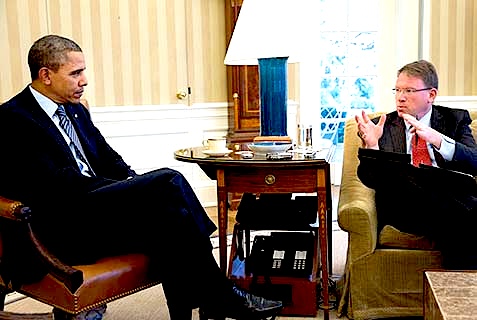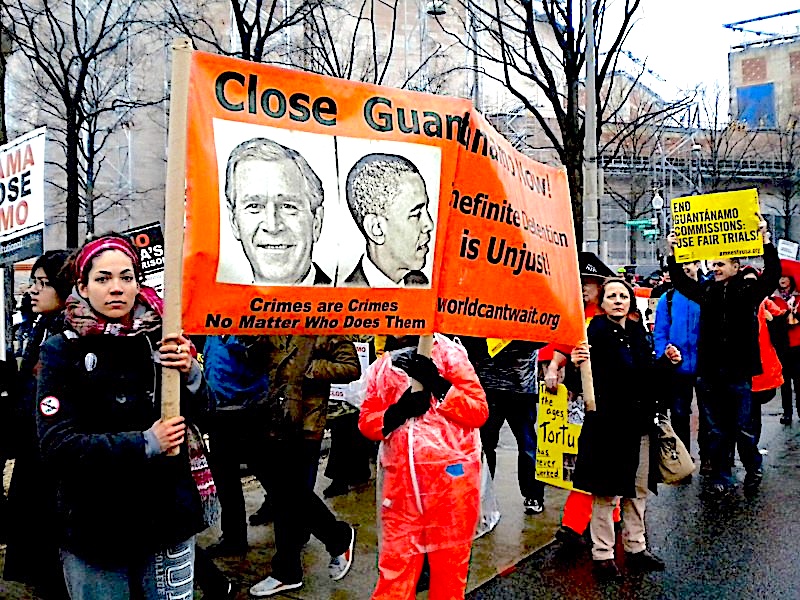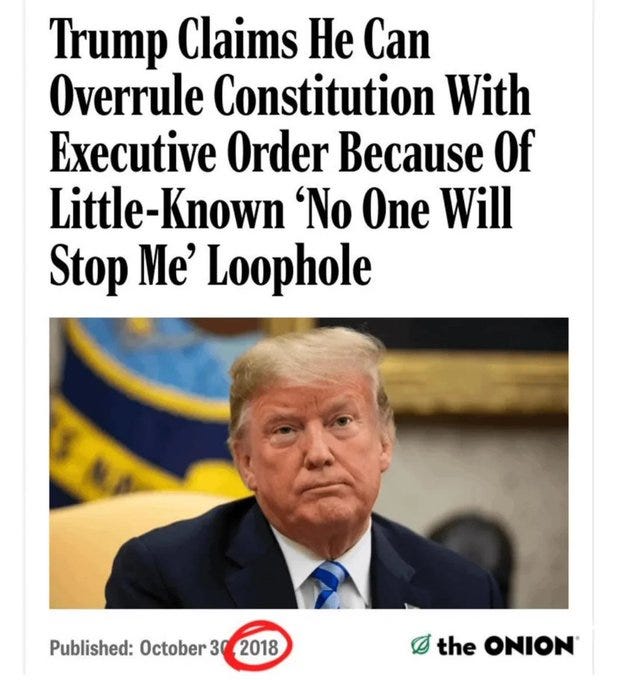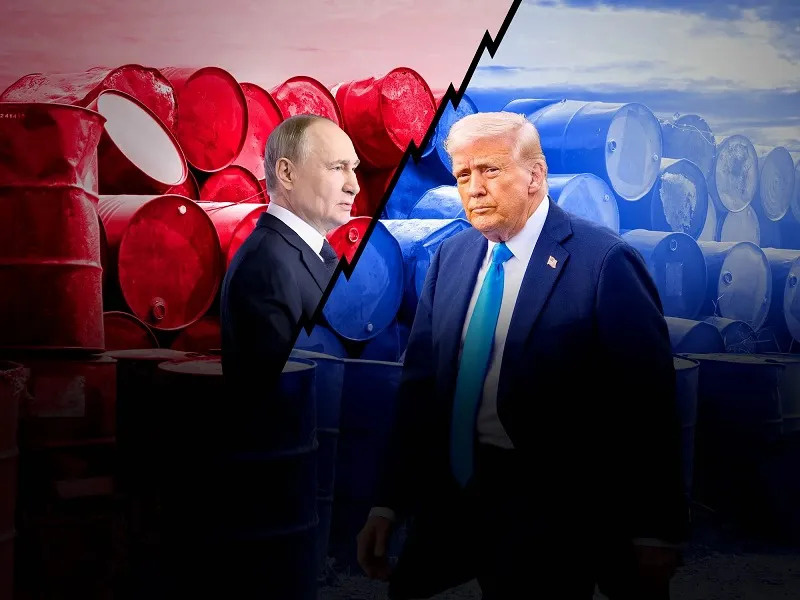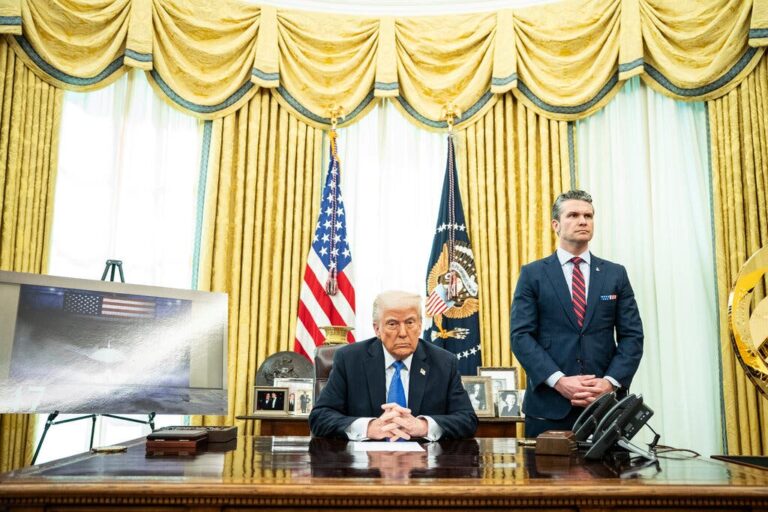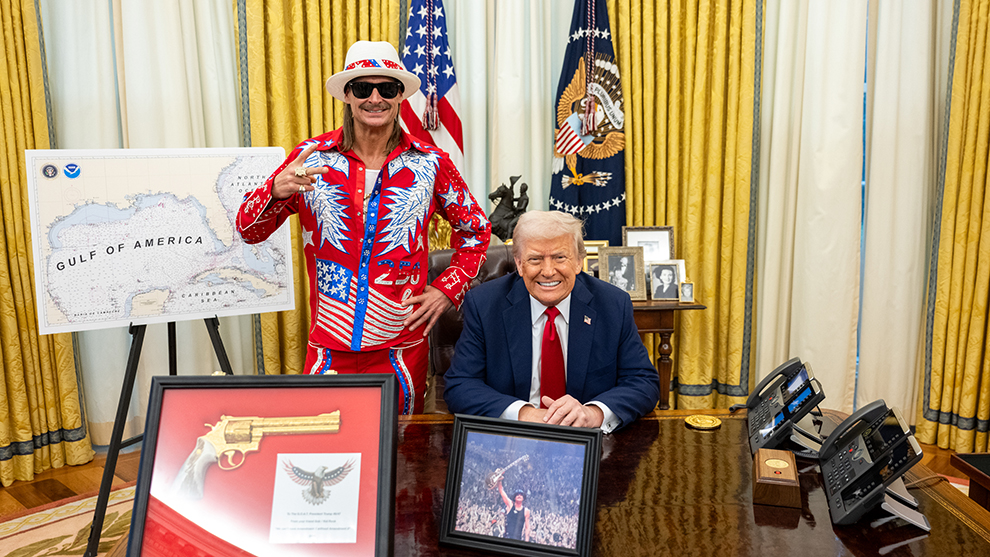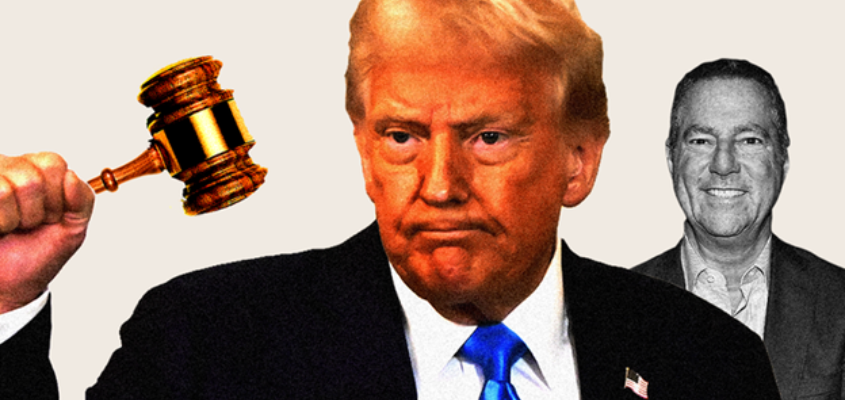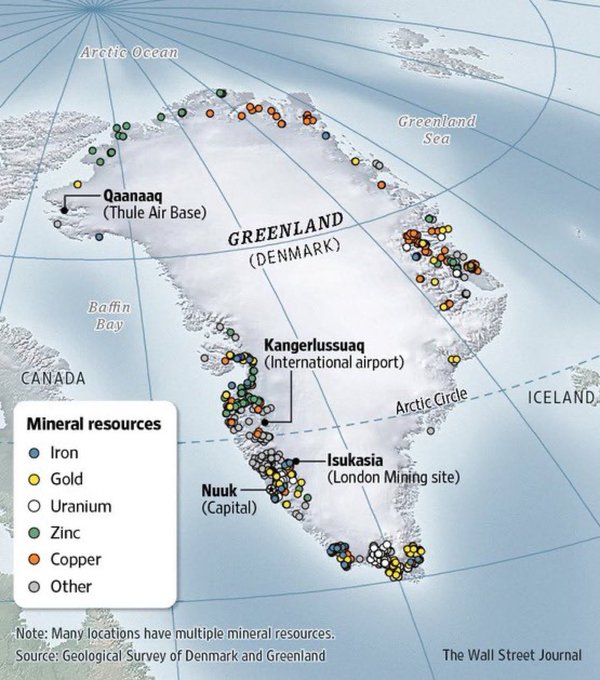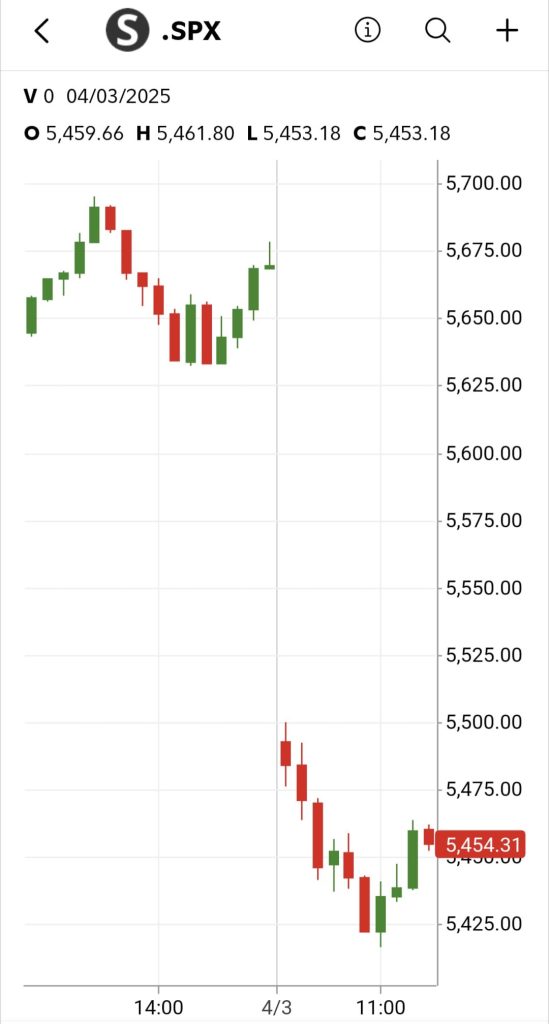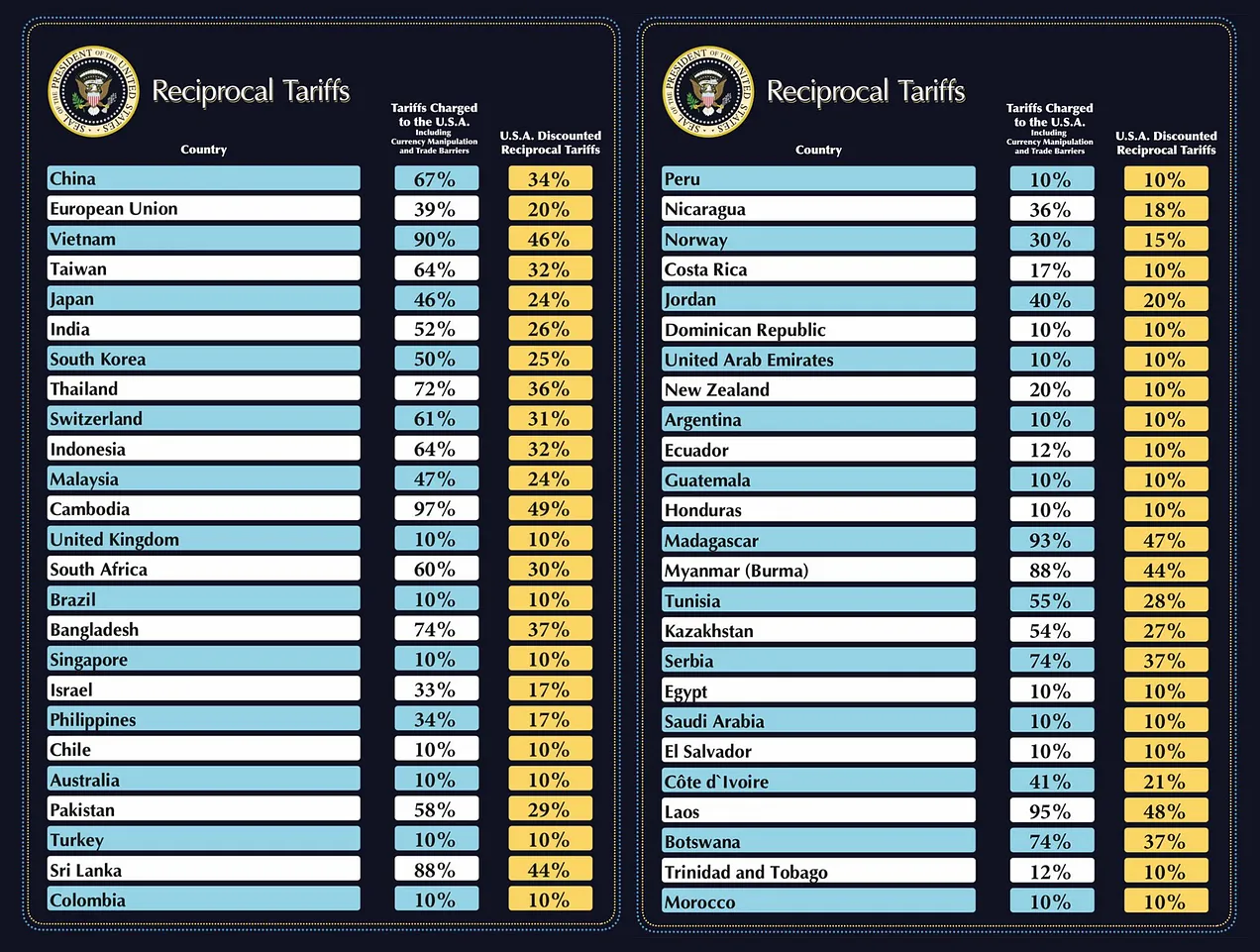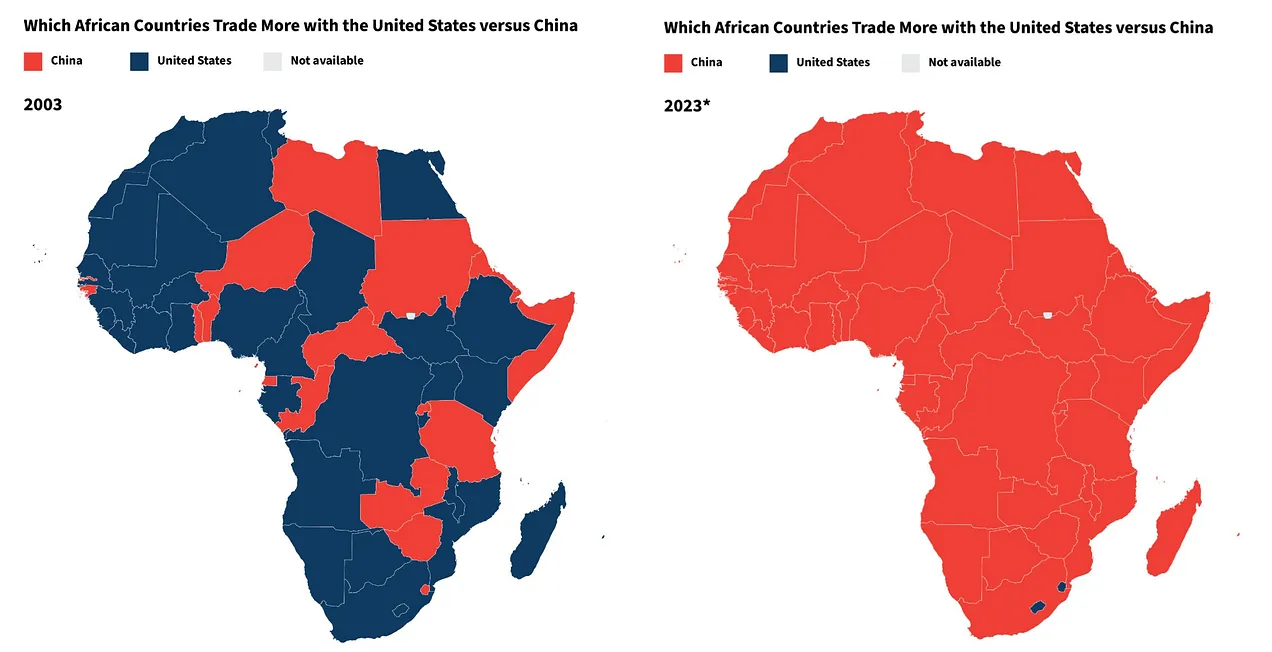US Stock Market Crash
April 5, 9:36

After the introduction of new tariffs on goods from most countries of the world, more than $7 trillion has burned in the US stock market in just over 2 days.
The stock market decline was the 4th in the entire history of observations.
Banks predict the beginning of a recession in the US already this year.
At the same time, the Trump administration says that all these are temporary fluctuations and when they bend everyone, this will bring hundreds of billions of dollars a year to the budget.
But judging by China's response, the consequences will be much more serious than Washington expects.
https://colonelcassad.livejournal.com/9764792.html
Google Translator
******
The TTT--Trump's Tariff Travesty
Karl Sanchez
Apr 03, 2025
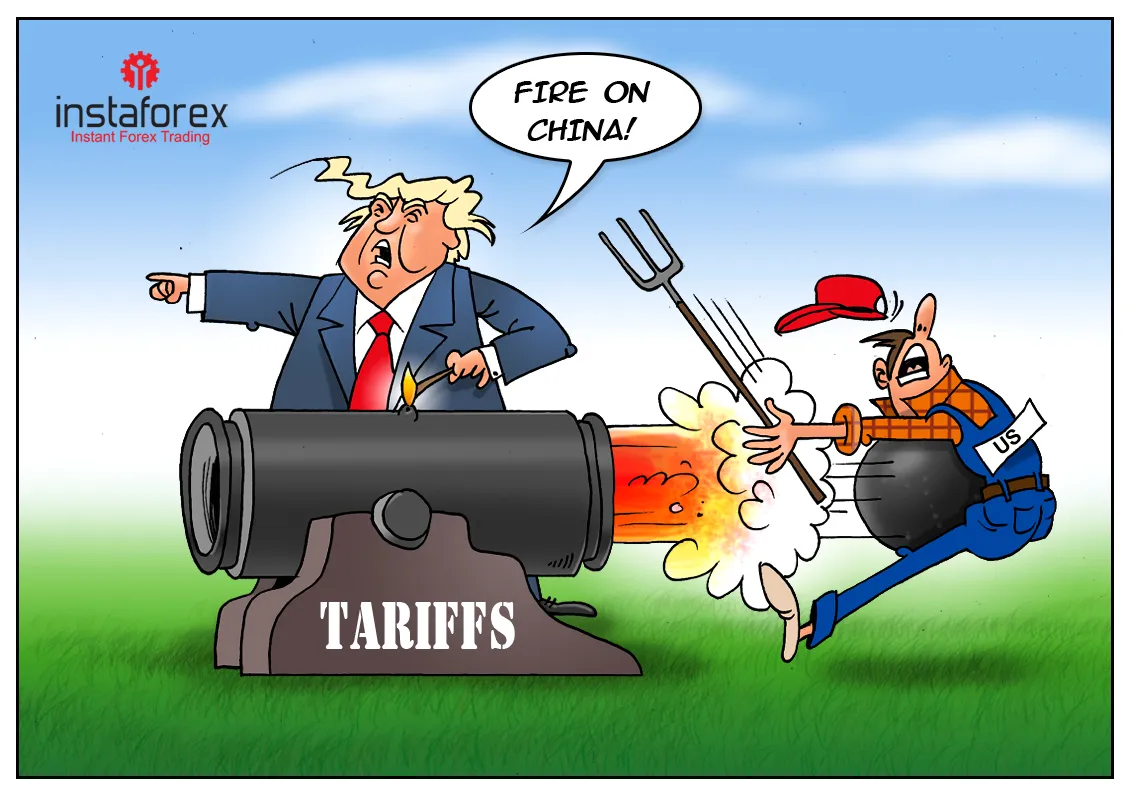
There were many to choose from, but none from the global perspective.
Trillions of dollars in market capital was erased today globally thanks to the TTT, although it’s difficult at the moment to calculate just how many trillions. IMO, the losses will need to be tabulated globally for the first ten days in April to arrive at the severity of the hit. There’s been lots of anticipation of this day, actually yesterday when the act was signed just after the markets closed in New York at 4pm Eastern. And in the run-up, there’s been lots of talk about tariffs. Today, there were two excellent programs that talked about TTT’s severity—the chat between Judge Napolitano and Jeffry Sachs and the three-way discussion between Nima, and Drs. Hudson and Wolff. The difference is Sachs and the Judge examined the legal side of the issue while the trio looked at the wider outcomes and the philosophy driving Trump’s behavior. Combine them, and you’ll be very well informed.
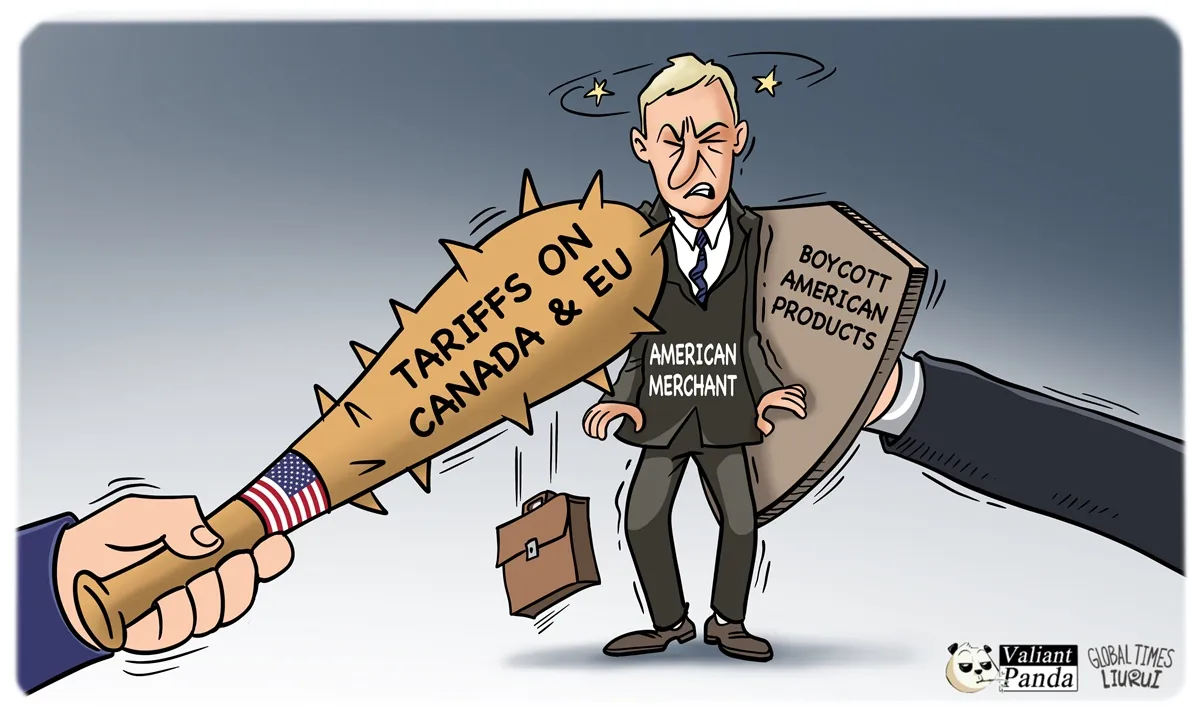
This cartoon from Global Times is closer to being correct as there will be a combined global effort to boycott and divest that ought to have been an ongoing project since the Outlaw US Empire abets the Zionist Genocide. Indeed, the Zionists dropped all their tariffs aimed at their benefactor only to discover they were on the list. Australia has a trade deficit with the Empire, meaning in Trump’s lingo Aussies weren’t “ripping off” Americans, but Australia was also on the Tariff list. Those are just two of many examples of the 100% irrationality of TTT. And even if the US judicial system finally rules the TTT is unconstitutional, the damage to many is already done. If Biden ruined the financial reputation of the Outlaw US Empire by weaponizing the dollar and the financial system, Trump is now finishing the job by destroying the Empire as a reputable trading partner and supporter of business. That last point is one major point made during the trio’s chat. And what the Judge asked Sachs is also crucial for the remainder of Trump’s term—“Didn’t anyone on Team Trump try to dissuade him from his irrational pipe dream?” Sachs’s answer doesn’t lend any confidence.
One last unrelated note, International Affairs magazine did air its full interview with Deputy Foreign Minister Ryabkov but only in video format without a printed transcript; so, that’s why there’s no report on what fully transpired. Miffed, yes, but I used the time wisely.
https://karlof1.substack.com/p/the-ttt- ... f-travesty
******
The History Making Machine
Nate Bear
Apr 04, 2025
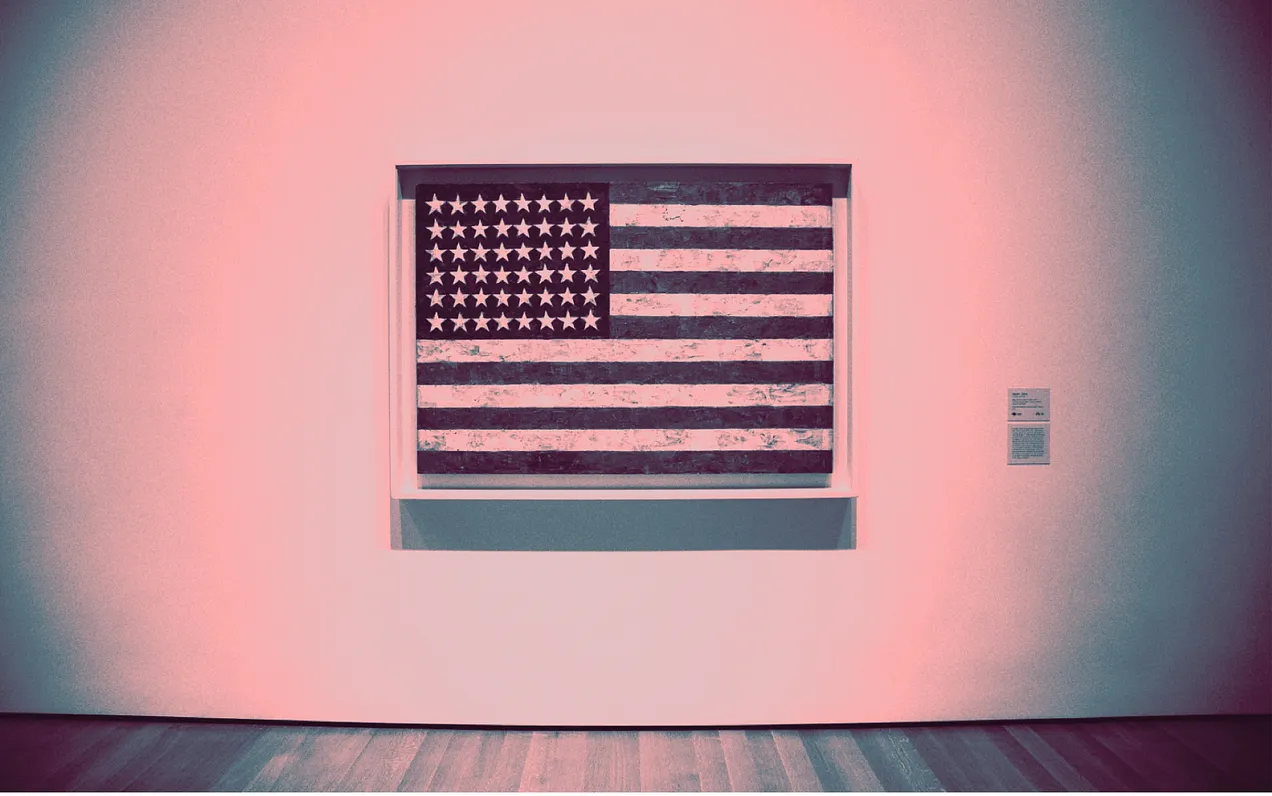
I’ve always wondered if people living through history knew they were living through history.
When I say history, I mean periods of time studied as central to the formation of the world future generations came to exist in.
I mean periods of global time that were contingent on events happening in a certain order in certain places.
Because everything, technically, is history. What the really important stuff is, the contingent stuff, is much harder to pin down.
In the last few years it’s been tempting to think we are living through history: Brexit, Trump 1.0, the pandemic.
But I’ve often thought this was just our egos talking, our subconscious desire to be Important People dictating how we understand the world around us. Our desire to be the ones - the special ones - truly living through history.
The reality is there have always been wars, always been madmen, always been disease, always been political crises, always been economic crises.
Picking out the important wars, madmen, disease and crises, locating history in the swirling of events, is much harder to do.
But after three months of Trump 2.0 I’m calling it: this is history.
These wars, madmen, diseases and crises are for the history books.
If there’s anyone left to study the past, in the future, they will study these times, these events.
And, critically, they will study them in their contingent order.
Trump 1.0 wasn’t history, not really. He was a first in a certain presentational sense, but that didn’t make him a man of history. For the most part he governed as a standard Republican. Rhetorically cruder, but not a great departure from what had come before.
Making him a man of history at that point was lazy.
Trump redux is a different beast.
Trump 2.0 is set to be a central, history book figure.
His will be an era-defining period of governance that will shape the world for decades.
Before we look at why, let’s look at how we got here. What created Trump 2.0? Four main things: Trump 1.0, Covid, Biden, Gaza.
Which is to say, the four-year gap between his first and second victories is absolutely critical.
We wouldn’t have got this Trump if he’d have won in 2020.
Why didn’t he win in 2020? Covid.
One of the things we’ve forgotten in our desperate rush to memory-hole the pandemic is that covid is the reason Biden won. All the polls said so. Trump was viewed as bungling the initial response. It seems unthinkable now, but Trump’s unwillingness to take covid seriously was seen as the main obstacle to a return to the normality most people craved. Biden was the safe pair of hands that could rid America of the coronavirus and get it back to business.
But, in the emergency covid period Biden presided over, attitudes hardened. People—at the elite and regular citizenry level—were radicalised. Elon Musk went from tweeting about rockets and hyping Tesla’s LGBTQ initiatives in 2019 to a self-declared obsession with defeating ‘the woke mind virus’ by 2022. So to this end he bought Twitter and pumped $100 million into getting Trump elected.
Among the citizenry the pandemic created new cultural dividing lines: lockdowns, masks and vaccine mandates. The measures introduced to combat the virus came to symbolise an anti-freedom to which the freedom-loving Donald Trump was the antidote. This was a bizarre turnaround: just a few years earlier Trump had been rejected because his own response to covid was seen as the obstacle to normal and the freedom it implied.
In both moments then, as counterintuitive as it appears, in the election of both Biden and Trump 2.0 we can see the craving for a normal that had somehow slipped out of reach.
In them both we can see the emergence of a coming apart.
Trump also had time, granted to him by defeat, to consider Trump 1.0. His main reflection was that he’d been held back and if he had his time again, he’d go all-out.
Trump’s first administration, despite his drain-the-swamp rhetoric, was staffed largely by Washington normies and insiders. They contained his mercenary instincts and kept him on a standard issue Republican trajectory. In the Biden years Trump spoke often about learning from this and how he wouldn’t make the same mistake twice. This time, America really would be great again. Again. Surrounded by absolute fealty and craven loyalists, Fox News hosts and wrestling magnates, his instincts are encouraged, not reined in.
The Biden years also gave us the Gaza genocide.
The refusal of Kamala Harris to break with Biden and his support for Israel’s genocide meant that millions couldn’t, in good conscience, vote for her. According to some polling, 30% of those who voted for Biden in 2019 didn’t vote for Harris in 2023 because of Gaza. Overall, 15 million fewer people voted for Harris than had voted for Biden. Suppressed turnout was key to Trump’s victory.
The Biden years also gave us Ukraine.
When Trump says the Ukraine war probably wouldn’t have happened if he’d been elected in 2020, because of his relationship with Putin, I believe him. And now, due to Trump’s desire to end a war that likely wouldn’t need ending in a different historical timeline, Europe is splitting from the US.
And now, sweeping tariffs. A global trade war.
This is where we have to start seriously considering the idea of history in the making.
Because, coming so soon after his shift on Ukraine, Trump’s tariffs are giving some European leaders serious reason to reconsider their reliance on, and alliance with, the US. The soft weakening of a military alliance is one thing. The hard breaking of an economic alliance is another thing altogether.
Tariffs are forcing European countries to really consider the shape of the west for the first time in a long time.
It was just announced that a delegation of European leaders including Emanuel Macron and Pedro Sanchez, Spain’s socialist party leader (who incidentally is presiding over the strongest economy in Europe right now), will soon meet with China’s Xi to discuss deepening economic cooperation.
In this we can start to see the contingencies of history.
Trump is blowing up the global neoliberal trade system that has stood unchallenged for the best part of fifty years because of China. In going global with country tariffs, the US is attempting to reassert global economic hegemony. When I wrote about the tariffs on Mexico, Canada and China a couple of months ago, I tried to understand them logically. Now, with them having gone global with the approach, I get it more clearly. They are a blunt message to the entire world: you can’t survive without us. Get in line. Do as we say. Give us cheaper access to your markets. Let us get even richer off you.
The US is betting countries can’t, or won’t, do business without them. Trump’s betting they’ll get in line.
Some might. Many won’t.
And the ones that won’t get in line won’t do so because of China.
China gives the world options that didn’t exist before. China is no longer just a place where things get made. It’s also a place where you can sell things to the biggest and fastest growing consumer economy in the world.
It’s an alternative pole.
From this point of view, America’s trade war against China is twenty years too late.
China, where, via a lab leak or a cave, a pandemic virus emerged that helped significantly to lay the ground for Trump 2.0.
Contingencies.
Of course America’s economy can’t be fully replaced by anyone. It is still the biggest economy, still the richest country. The dollar is still dominant.
And it is these tensions that will force history on us.
Empires don’t just lie down.
When America doesn’t get what it wants, when countries don’t fall into line, when it doesn’t reassert dominance, Trump isn’t going to give up.
And a world in economic crisis, which is what these tariffs will deliver, will give America, as the primary antagonist, nothing to lose.
They will lash out and chase their losses.
For this reason a US invasion and annexation of Greenland within the next couple of years is likely.
Israel, after cleansing Gaza and annexing the West Bank, will take advantage of global chaos and attack Iran with full US support and weaponry.
War, in some capacity, limited or full blown, between the US and China, shouldn’t surprise anyone.
The Gaza genocide has already put the concept of international law on life support. We stand primed for its full disintegration.
Conflict with China wouldn’t just be on Trump. Every US administration for the last thirty years has been war gaming it. Money has flowed easily to Lockheed Martin, Raytheon and the military-industrial complex by invoking the threat from a country that, unlike the US, has no track record of military invasions.
In the meantime the US will ramp up the disappearance and deportation of non-citizens who dare to criticise genocide.
With war plans in motion, they’ll then move on to American citizens and broader critics of empire.
Germany is already following America’s lead and deporting those who oppose genocide.
Others in Europe will follow.
With the loss of the US as an anchoring presence, European bifurcation will speed up. Some countries will cling to the US, others will reorientate to China.
This bifurcation will come in the context of massive rearmament on a continent that historically has seeded the world’s major wars.
All of this as our planet burns and floods.
When we read about crises in history aren’t we always left with that nagging question: how did they let it get to that?
Couldn’t they see what was going to happen?
Why didn’t someone do something?
Like we study them, they will study us.
They will ask how.
But the future should know we are already tortured by the same question.
How did we let it get to this?
https://www.donotpanic.news/p/the-histo ... ng-machine
******
Global Over-Stretch: Red Sea, Black Sea, Panama, South and East China Seas
By Dee Knight - April 4, 2025 1

[Source: youtube.com]
“Stupid, asinine, insane” was Scott Ritter’s description of President Donald J. Trump’s decision to launch massive bombing attacks on Yemen on March 15. The Ansar Allah movement (also known as the Houthis) resumed its blockade of Israel-bound ships in the Red Sea after Israel re-launched its war and siege of Gaza.
Trump chose not to tell Israel to stop in the interests of peace, attacking Yemen instead. By international law, all nations are expected to cut ties with the Israeli occupation and act to prevent genocide. So international law favors Yemen, not the U.S.
The U.S. attacks have killed more than 100 Yemeni people, including women and children. The cost in U.S. lives would be higher if the Yemenis were to sink any U.S. warships.
On March 19 Ansar Allah began a new attack on U.S. warships—their fourth attack on the carrier fleet in 72 hours.
They launched “a number of cruise missiles and drones, targeting the aircraft carrier USS Harry S. Truman and a number of enemy warships,” Ansar Allah said, according to an AFP report.
Meanwhile, a People’s Dispatch report said ِthe Al-Qassam Brigades, the military wing of Hamas, shot a barrage of rockets at Tel Aviv on March 20, and the coastal city of Ashkelon on March 21. The rockets and missiles launched from Yemen and Gaza reportedly disrupted flights at Ben Gurion Airport. Ansar Allah announced on March 22 it targeted Ben Gurion Airport for the second time within 48 hours, as well as a number of warships affiliated with the U.S. aircraft carrier USS Harry S. Truman.
Ansar Allah warned all airlines that “Ben Gurion Airport has become unsafe for air traffic and will remain so until the aggression against Gaza stops and the blockade is lifted.”
Both Ansar Allah and Hamas said their attacks on the cities occupied by Israel were carried out in retaliation for Israel’s renewed genocidal aggression on Gaza that has left more than 700 people dead and more than 1,000 injured since March 18.
Hamas said Thursday it is still committed to the Gaza cease-fire agreement. “Talks are under way with mediators to stop the aggression against our people and pressure the [Israeli] occupation to adhere to the cease-fire agreement,” Hamas spokesperson Abdul Latif al-Qanou said in a statement. “We are working with mediators to permanently spare our people war and to ensure the occupation’s withdrawal from the Gaza Strip,” he added.
Trump used his social media platform Truth Social to condemn the Houthis’ “unrelenting campaign of piracy, violence and terrorism.” A Houthi spokesperson said “The Red Sea is not part of the United States, and Yemen has the right to defend itself,” Newsweek reported on March 21.
Trump said the Houthi attacks have disrupted shipping through the Red Sea and Gulf of Aden, key waterways for energy and cargo shipments between Asia and Europe through Egypt’s Suez Canal, AP reported on March 17. It said that, from November 2023 until January 2025, the Houthis had attacked more than 100 merchant vessels with missiles and drones, sinking two vessels and killing four sailors.
The attacks on the Houthis are “a not-so-subtle signal to Iran,” the AP report said. Iran’s Revolutionary Guard chief, General Hossein Salami, said: “We have always declared—and we declare again today—that the Yemenis are an independent and free nation in their own land, with an independent national policy.”
Both Trump and Defense Secretary Pete Hegseth have warned Iran of an “unrelenting response” over what they claim is its support of Ansar Allah. Professor Mohammad Marandi of Tehran University said that, if the U.S. were to carry out attacks against Iran, that could destabilize the world economy, as Iran could shut down the Persian Gulf and severely cripple the U.S.-allied oil-producing states there.

[Source: researchgate.net]
“Navigating Troubled Waters: Impact to Global Trade of Disruption of Shipping Routes in the Red Sea, Black Sea and Panama Canal” was the title of an “UNCTAD Rapid Assessment” in February 2024. “For the first time, the world faces simultaneous disruptions in two major global maritime trade waterways, with far-reaching implications for inflation and food and energy security,” the report began.
“Since November 2023, escalating attacks on ships in the Red Sea have been compounding disruptions in the Black Sea caused by the war in Ukraine and in the Panama Canal due to climate-induced droughts.”
Trump Wants the Panama Canal
After Trump declared “the Panama Canal is ours, and I’m gonna take it back,” he got what he wanted when the BlackRock private equity group agreed to buy ports at both ends of the canal for $19 billion from CK Hutchison, a conglomerate owned by Hong Kong magnate Li Ka-shing. But The New York Times reported on March 22 that “China’s leaders are now threatening to stop Mr. Li and the company he controls, CK Hutchison, from seeing the deal through, accusing the conglomerate of betraying Beijing.”
A major Hong Kong newspaper, Ta Kung Pao, published a commentary on March 21, calling to “halt the transaction,” adding that “it is common sense that any action that is seriously harmful to the country and society will be regulated and punished by law,” according to a Global Times report. Hong Kong Special Administrative Region (HKSAR) Chief Executive John Lee said that any transaction must comply with legal and regulatory requirements, and the HKSAR government will handle the matter in accordance with the law and regulations, the report concluded.
It was Trump’s favorite former president, William McKinley (1897-1901), who first pushed for the Panama Canal. But McKinley was shot in Buffalo, New York, on September 6, 1901 (he died eight days later), by a young Polish-American and self-proclaimed anarchist, who believed that McKinley was a symbol of oppression and the “enemy of the good people, the working people.”
The canal became the pet project of McKinley’s successor, President Theodore Roosevelt (TR). He first had to buy the rights and property for the canal from France, and then craft a treaty to lease it from Colombia, since Panama did not exist as a separate country at that time.
The treaty was ratified by the U.S. Senate on March 14, 1903, “but the Senate of Colombia unanimously rejected the treaty since it had become significantly unpopular in Bogotá due to concerns over insufficient compensation, threat to sovereignty, and perpetuity,” according to Wikipedia.
So TR actively supported a separation of Panama from Colombia and, on November 2, 1903, U.S. warships blocked sea lanes against possible Colombian troop movements coming to put down a Panama rebellion. Panama declared its independence from Colombia on November 3, 1903.
The United States quickly recognized the new nation. This happened so quickly that, by the time the Colombian government in Bogotá launched a response to the Panamanian uprising, U.S. troops had already entered the rebelling province.
So, through TR’s decisive action, the United States acquired both the right to build the canal and a “loyal ally” in Panama.

[Source: en.wikipedia.org]
President Roosevelt famously stated, “I took the Isthmus, started the canal and then left Congress not to debate the canal, but to debate me.” Several parties in the United States called this an act of war on Colombia: The New York Times called it an “act of sordid conquest”; The New York Evening Post dubbed it a “vulgar and mercenary venture.”
The U.S. maneuvers are often cited as the classic example of U.S. gunboat diplomacy in Latin America. It became a hallmark of TR’s motto—“speak softly but carry a big stick.” After the revolution in 1903, the Republic of Panama became a U.S. protectorate until 1939.
In 1921, Colombia and the United States signed a treaty, in which the United States agreed to pay Colombia $25 million—$5 million upon ratification, and four $5 million annual payments—and grant Colombia special privileges in the Canal Zone. In return, Colombia recognized Panama as an independent nation, according to the Wikipedia report.
In February 1904 the U.S. established an “Isthmian Canal Commission,” which made a deal with Panama to get control of the Panama Canal Zone, over which the U.S. exercised sovereignty. But after World War II, U.S. control of the Zone became contentious, and relations between Panama and the U.S. became tense. “Demands for the United States to hand over the canal to Panama increased after the Suez Crisis in 1956, when the United States used financial and diplomatic pressure to force France and the UK to abandon their attempt to retake control of the Suez Canal, previously nationalized by the Nasser regime in Egypt. Panamanian unrest culminated in riots on Martyrs’ Day, January 9, 1964, when about 20 Panamanians and 3 to 5 U.S. soldiers were killed.” (From the Wikipedia report)
Ten years later the Panamanian nationalist leader Omar Torrijos launched negotiations for a treaty for Panama to take control of the canal. Jimmy Carter signed the deal with Torrijos in September 1977, his first year as president. The Wikipedia report says “The treaty led to full Panamanian control effective at noon on December 31, 1999, and the Panama Canal Authority (ACP) assumed command of the waterway. The Panama Canal remains one of the chief revenue sources for Panama.”
Ronald Reagan, in his campaigns in 1976 and 1980, insisted that “the United States had built, bought and paid for the Panama Canal and should keep it.” He cited the Monroe Doctrine that “the United States is the protector of the Americas.” Trump is harking back to Reagan’s themes.
On December 21, 2024, Trump claimed the rates Panama was charging American ships were “exorbitant,” and in violation of the Torrijos-Carter Treaties. He then added that the canal was “falling into the wrong hands,” referring to China. Panamanian President José Raúl Mulino responded, denying that the United States was being unfairly charged or that anyone besides Panama was in full control of the canal, and affirming that the canal was part of the country’s “inalienable patrimony.”
Three days later Panama City’s streets filled with protesters calling Trump a “public enemy” of Panama. The same day, the Bolivarian Alliance for the Peoples of Our America (ALBA), made up of ten Central and South American countries, denounced Trump’s comments and affirmed its support for Panama’s “sovereignty, territorial integrity and self-determination.”
Trump, however, has not given up. In early February, according to Wikipedia, the U.S. Department of State posted on Twitter/X that the Panama Canal would no longer be charging U.S. government vessels to cross. President Mulino called this an “intolerable falsehood,” and Secretary of State Marco Rubio (who had departed Panama a few days earlier) had to correct the announcement, saying he “expects” Panama to begin doing so in return for the Torrijos-Carter Treaties’ guarantee of U.S. military protection in the event of an attack on the canal.
According to The New York Times, the Hong Kong-based Li family felt “under political pressure to exit the ports business.” Discussions with BlackRock about the Panama Canal had begun only a few weeks prior, coinciding with the beginning of the Trump administration.
Now the question is whether the Chinese government will press the Hong Kong company to back out of the deal. And what will happen next?
Defense Secretary Hegseth Heads East
U.S. Defense Secretary Hegseth headed to Hawaii, Guam, the Philippines and Japan the last week of March. It was Hegseth’s first official visit to the Indo-Pacific region. The Global Times observed that it is unusual: Such trips typically include South Korea, but Hegseth omitted South Korea and included the Philippines instead. The Global Times commented that “this arrangement demonstrates the U.S. intention to target China and is likely to encourage the Philippines to take further provocative actions against China.”
In early March 2025, Hegseth told Fox News that the United States is “prepared” to go to war with China. He did not comment about possibilities that the U.S. could lose in a fight against China. All recent Pentagon war games have concluded the U.S. cannot win such a conflict.

[Source: youtube.com]
The Global Times cited Chinese military expert Zhang Junshe that Hegseth’s decision to forgo a visit to South Korea was linked to that country’s unstable domestic political situation, but “this does not imply a diminished role for South Korea in the U.S. Indo-Pacific Strategy, as it remains a crucial military ally for the U.S.”
Hundreds of thousands of people in South Korea have mobilized against U.S.-backed President Yoon Suk Yeol, who has been arrested and is facing impeachment for staging a fake war exercise aimed at suppressing his opponents and starting a war. The U.S. maintains operational control of the Korean military, which has 600,000 active-duty troops and double that number in reserve. The U.S. also maintains a trilateral security treaty, JAKUS, with Japan and South Korea, preparing for war against both North Korea and China.
The Global Times suggested that Hegseth’s choice of the Philippines and Japan for his first visit to the region highlights the U.S. strategic intent toward China. “Washington’s alliances with Manila and Tokyo serve as key tools for its involvement in maritime issues surrounding China, advancing its strategy of using maritime leverage against China.” By relying on these alliances, the U.S. aims to continuously contain and pressure China on issues related to the East China Sea and South China Sea.
The Global Times suggested that Hegseth would make strong diplomatic gestures during this visit to encourage both the Philippines and Japan against China.
The U.S. Commission on the National Defense Strategy issued a report last fall that said “The United States confronts the most serious and the most challenging threats since the end of World War II.
“The United States could in short order be drawn into a war across multiple theaters with peer and near-peer adversaries, and it could lose.”
Under the leadership of President Trump and his team, that seems to be a solid prediction.
https://covertactionmagazine.com/2025/0 ... hina-seas/
*******
Trump’s Non-Cooperative Game
Posted on April 5, 2025 by Yves Smith
Yves here. I wish this post had provided a more in-depth discussion of what game theory says about the strategy, if you can call it that, employed by Trump. Perhaps the results really are too bushy to say much. But analyses like this also presuppose that Trump is driving towards some sort of desired end state. I highly doubt that is the case, despite his love of the 1890s. For Trump, this is all about process, about repeated demonstrations of his dominance and power, such as having very big type lead stories all over the world virtually every day with his name in them, even if outcomes are bad. Chas Freeman, Larry Wilkerson, and Professor Marandi, in their latest talk with Nima, discussed how Trump’s one-note “art of the deal” negotiating strategy is just about the worst way to try to come with an agreement with Russians or Iranians.
By Sylvester Eijffinger, Emeritus Professor, Tilburg University. Originally published at VoxEU
With President Trump’s announcement of sweeping tariffs on 2 April, he appears to be waging an economic war against the rest of the world. This column turns to non-cooperative game theory to attempt to understand what Trump thinks the US will gain from this war. Although including Europe’s military security vulnerabilities may give Trump the upper hand in his ‘game’, it is likely that in the end there will only be losers.
President Trump is once again waging a ruthless economic battle against the rest of the world. While during his first term it remained a threat, in his second term he appears serious about initiating a global trade war. Trump is not only attacking old enemies such as China; friendly Europe will also have to pay a price in this fight (Evenett and Fritz 2025). What does he think the US will gain from this? In this column, I will try to sketch a Trumpian world view, which I will then apply to the prosaic reality of economic science.
If we try to explain the current situation on the basis of a non-cooperative game theoretical model, a lot becomes clear. The answer to the question of the purpose of the trade war can be found in this mathematical model, which was developed during the Cold War between the US and the USSR. In initiating a trade war with the US’s geopolitical allies Canada, Mexico, and now the EU, Trump is forcing a non-cooperative game on his trading partners without any negotiation or restraint. This represents a similarity between Trump’s first and second terms in office.
In the first game, however, power relations were still equal. It was a so-called Nash game, named after the mathematician and Nobel Laureate John Nash. In Nash’s model, all opponents have equal power and therefore all participants act independently of each other, without agreements with each other and also without coalitions.
This time around, a much more complex game is being played. In Trump’s first trade war, there was no clear winner and all parties eventually compromised, with some collateral economic damage into the bargain. Now the deck has been fundamentally reshuffled. This time is different and there is no question of equality. Trump has raised the stakes by also including European military security in the non-cooperative game. America is still the dominant player in the military field (Yared 2024) and in particular when it comes to military intelligence. This gives Trump the upper hand in the game. The US leads and Europe can only follow. In game theory, this is called a ‘Stackelberg game’.
Because it has become not only a trade war but also a security crisis, the predicted outcome of the game becomes a lot more complex. Who could imagine that President Macron of France would make nuclear weapons available for European defence and that, under new Chancellor Merz, Germany would let go of the so-called Schuldenbremse?
Trump appears to be carrying out Project 2025 – the plan of an ultra-conservative think tank in which he rules by decree to sideline the US Congress (e.g. Anil 2025). And he doesn’t care about constitutional boundaries, which is leading to clashes with many courts and even with Chief Justice John Roberts of the United States Supreme Court.
But where does this game end, and what will be the consequences for the US and for Europe? In America, the pendulum of power usually swings further from ‘left’ to ‘right’ than in Europe. And Trumpism is a reaction to the ‘wokeism’ that dominated under the Presidents Obama and Biden.
Trump is in a hurry because, in the midterm elections a year and a half away, the Republicans could lose massively, and then there would be a new balance with his Democratic opponents in Congress. That is how it has always been so far. So, Trump wants to achieve his ultimate goal – to take back dominance in a military, political, and economic sense – quickly. He is making no secret about that. America is trying to put pressure on the rest of the world. But because Trump is charging on all fronts at the same time, there are no more separate files. And that makes the outcome of this game incredibly complex.
In the end, Trump is not going to win, but he will have damaged relations with America’s allies. This non-cooperative game that is Trump enforcing on his trading partners will only have losers, and this time there will be another compromise with Canada, Mexico, Britain, and the EU.
https://www.nakedcapitalism.com/2025/04 ... -game.html
Trump’s Tariffs Are Extremely Dumb, Just Not For The Reasons You Might Think
Posted on April 5, 2025 by Yves Smith
Yves here. Brian Berletic makes a point of saying, and documenting, how in the foreign policy arena, Trump represents continuity of agenda rather than the sort of break his backers claim he represents. This post makes a similar argument about the Trump tariffs and trade program.
By Iza Camarillo, the Research Director for Public Citizen’s Global Trade Watch. Before joining Public Citizen, she worked as an international arbitration and trade attorney, specializing in investment arbitration, global supply chain compliance, and WTO disputes on unfair trade practices. Originally published at Common Dreams
On April 2, Donald Trump declared a national emergency and announced sweeping tariffs on nearly all imported goods. The headlines were dramatic — tariffs on China, allies like Canada and Mexico, and everything from cars to coffee beans. His administration framed the move as a patriotic stance for “reciprocal trade” and economic sovereignty.
Don’t be fooled. This isn’t the collapse of “free trade.” It’s the continuation of corporate globalization — just with a MAGA bumper sticker slapped on it.
Trump says he’s standing up for American workers. But he’s the same president who signed the United States-Mexico-Canada Agreement (USMCA) and called it “the fairest, most balanced, and beneficial trade agreement we have ever signed into law.” The rebranded North American Free Trade Agreement (NAFTA) deal — despite some improvements forced in by congressional Democrats and civil society organizations — contained much of the same structural rot that has enabled outsourcing, empowered monopolies, and tied the hands of governments trying to protect their people and environment.
For decades, “free trade” deals like NAFTA locked in rules written by and for multinational corporations: rules that made offshoring easier, gutted environmental protections, and prioritized investor rights over worker rights. Stagnant wages, emptied factory towns, and rising income inequality have caused widespread pain and frustration among working Americans — which Trump has weaponized again and again.
Tariffs can be part of the answer to these problems, but Trump’s ham-handed approach ain’t it. There’s no industrial strategy. No labor plan. No climate protections. Just a unilateral, top-down stunt that does nothing to dismantle the corporate architecture still rigging the global economy.
Pair this “concept of a plan” with the rest of his agenda: gutting investment in vital sectors such as biomedical research, support for basic science and clean and affordable energy technologies and products; slashing all efforts to combat child labor and other egregious labor rights violations around the world, providing tax cuts for billionaires and corporations; stripping away health care, food support and other vital services for the most vulnerable Americans, undermining Social Security, and decertifying and undermining the power of labor unions.
It’s clear working people will not be the winners here.
Who Wrote the Rules? U.S. Corporations, Not Foreign Adversaries
Trump loves to blame other countries, claiming global trade has “looted, pillaged, raped, and plundered” the U.S. economy in his “Liberation Day” speech. He claims that the U.S. has been victimized by other countries and has been “too nice” in response.
Nothing could be further from the truth — the rules of the neoliberal trade system were rigged in favor of large corporate interests in the Global North. While workers in the U.S. and around the world were the losers, Wall Street, Big Tech, Big Ag, Big Pharma, and other U.S. corporate giants have always been the winners.
For decades, U.S. corporate lobbyists have used their privileged access to closed-door trade negotiations to rig the rules to maximize their profits, not to serve working people, small businesses, or the environment.
They pushed for extreme intellectual property rules to entrench Big Pharma monopolies that keep the price of medicines sky high, with deadly consequences. They demanded open capital markets and deregulated financial flows for Wall Street while securing rules that let agribusiness giants flood foreign markets with subsidized U.S. commodities, displacing millions of farmers and leading to forced migration.
At the same time, they ensured that governments couldn’t support domestic industries, raise labor standards, or enforce environmental protections without being accused of “trade distortion.” The result was a race to the bottom for workers and communities — here and abroad — with record profits for corporate giants.
It matters a lot that Trump is identifying the wrong perpetrators of the failed global trade system because that sets the table for wrong solutions.
Once we identify multinational corporations as the architects of the current system, we’re directed toward the right solutions – not blanket, high tariffs based on mindless formulas, but a new trade policy and new trade rules that prioritize the interests of workers, consumers, and the environment.
NAFTA to USMCA: Same Corporate Model With Some Improvements (No Thanks to Trump)
Trump spent years railing against NAFTA as the “worst trade deal anybody in history has ever entered into,” tapping into the legitimate grievances of workers and communities harmed by its race to the bottom. He campaigned on a promise to eliminate it and replace it with a better agreement for workers.
However, once elected, he opted to renegotiate and rebrand the deal in the form of the USMCA, which he then insisted was “the best trade deal in history.” Now, in a dizzying reversal, he’s claiming the USMCA has been a disaster that only an aggressive wave of “retaliatory” tariffs on Canada and Mexico will fix.
In reality, while some improvements were forced into the negotiation, the USMCA largely preserved the core logic that made NAFTA so harmful in the first place. It expands corporate rights, limits democratic oversight, and undermines public protections in the name of increased trade.
The new labor provisions — often cited as proof of a “new era” in trade — were not original features of Trump’s deal. They were won through months of intense organizing and negotiation by House Democrats, labor unions, and civil society groups.
Congressional Democrats working in close alliance with the AFL-CIO drew a hard line. Backed by the relentless organizing of groups like Public Citizen, the Communications Workers of America, United Steelworkers, and a transnational coalition of Mexican and Canadian labor and civil society partners, they made it clear: they would block passage of any deal unless meaningful labor enforcement were included and damaging Big Pharma giveaways were removed.
Trump’s administration favored language that preserved corporate prerogatives and offered only symbolic nods to labor rights. Still, in the end, it acquiesced to congressional Democrats’ demands. It incorporated essential tools like the facility-specific Rapid Response Mechanism for labor enforcement and eliminated some of the most egregious giveaways to Big Pharma.
However, the structural rot from NAFTA remained.
While experts across the ideological spectrum lauded the drastic reduction of controversial investor privileges that allow corporations to sue governments over public interest laws through investor-state dispute settlement (ISDS), Trump preserved ISDS for fossil fuel firms operating in Mexico — a carve-out aggressively pushed by Big Oil.
Agribusiness also retained its arsenal. The ongoing U.S. trade challenge to Mexico’s restrictions on genetically modified corn — measures rooted in precautionary health standards and cultural preservation — reveal the deal’s true intent. Rather than respecting national policy space over food safety, trade rules are once again being deployed to dismantle domestic protections at the behest of corporations.
Not only did Trump fail to fix NAFTA, but he made it even worse in at least one crucial way: Big Tech secured its wishlist in the form of a digital trade chapter. These new terms undermine the ability of U.S. states, Congress, and other countries’ governments to hold Big Tech accountable for gender and racial bias in AI, rampant abuse of our privacy, and monopolistic overreach.
Performative “Protectionism” and the Authoritarian Trade Playbook
Far from dismantling the corporate trade regime, Trump’s first term revealed him as a loyal steward of it — so long as he could plaster his name on it. Despite the USMCA rebrand, he left the core NAFTA structure intact and continued to stoke public anger over working people’s struggles — not by confronting the root causes but by scapegoating other nations. And he has been increasingly employing tariff threats as his weapon of choice — not in pursuit of justice but as a blunt instrument of control.
Just weeks ago, Trump threatened new tariffs unless Mexico deployed troops to militarize the border. He pressured Colombia to accept a deportation flight of asylum seekers.
Big Tech companies are awaiting their handouts, as it is widely expected that Trump will lift tariffs on countries that agree to undo tech accountability policies.
And perversely, he is using tariffs as a cudgel to pressure other countries into signing the very liberalizing trade agreements he claims to oppose.
“Liberation Day” was more of the same from this ever-more-authoritarian White House: an emergency decree bypassing Congress, escalating instability, and concentrating power in the executive. Trump hasn’t rejected the anti-democratic nature of the neoliberal trade model — he’s replicating it with a vengeance.
All Madness, No Method
While tariffs can be a useful tool, they must be transparently employed in strategic sectors for a clear purpose following careful analysis and open debate.
Trump’s tariffs, however, are based on misleading data and flawed logic. He uses exaggerated trade deficit calculations and stays silent on how the U.S. dollar’s dominance enables America to import far more than it exports, a luxury most Global South nations — burdened with debt and structural trade deficits — cannot afford.
The methodology behind these tariffs has experts scratching their heads.
Trump claimed that the “reciprocal tariffs” were derived from a detailed assessment of each country’s tariff and non-tariff barriers (more on these in a moment). In fact, the number assigned to each country seems to be based on the difference between the total value of imports the U.S. receives from a country versus the amount we export to it.
Apparently, no regard was given to why there may be a large imbalance. For example, Lesotho, which Trump dismissed as a country “nobody has ever heard of,” was hit with the highest tariff of any country at 50%. Forget the fact that the small, landlocked country’s population of 2 million may not be able to afford Made in America products, leading to a lopsided trade balance.
The crude formula used to determine each country’s “reciprocal” tariff was described by Nobel Prize-winning economist Paul Krugman as something that appeared to be “thrown together by a junior staffer with only a couple of hours’ notice,” and “reads like something written by a student who hasn’t done the reading and is trying to bullshit their way through an exam.”
As some commentators have noted, this tariff breakdown is what you get if you ask ChatGPT to come up with a U.S. trade policy. This could very well be the first global economic policy written “of, by, and for” our robot overlords. What could possibly go wrong?
The Corporate Wishlist
Since the Trump administration clearly did not take on the, admittedly Herculean, task of reviewing the thousands of tariffs and trade barriers imposed by hundreds of countries, it simply used trade imbalances as a crude proxy. It’s a stand-in for the cost of that country’s tariffs and, importantly, its non-tariff barriers.
“Non-tariff barrier” is trade-speak for “any policy that’s not a tariff” but might restrict trade — from climate protections to minimum wage laws to consumer protections in the form of toxic food additives. While many non-tariff barriers serve vital public policies, corporations and trade negotiators often treat them as obstacles to profit.
According to the April 2 executive order, Trump can unilaterally decide to lower the tariffs imposed on a country if it takes “significant steps to remedy non-reciprocal trade arrangements and align sufficiently with the United States on economic and national security matters.”
What constitutes a “significant step” isn’t defined, but it certainly looks like an open invitation for governments to slash their tariffs and reverse policies to appease Trump and his billionaire buddies.
For what exactly those policies may be, just look to the report Trump waved around at the beginning of his so-called “Liberation Day” tariff announcement speech in the Rose Garden.
That document is a 400-page list of the policies that other countries have enacted — or are even considering enacting — that U.S. corporations don’t like. It’s the National Trade Estimates Report on Foreign Trade Barriers, an annual government report that has long been criticized as an inappropriate overreach to name and shame other countries’ legitimate public interest policies. It’s also a glimpse of the policies that Trump may seek to have destroyed in exchange for tariff relief.
The policies targeted in this year’s report include climate protections, including Canada’s Clean Fuel Standard, the European Union’s Deforestation-Free Supply Chain Regulation, and Japan’s renewable energy incentives — all of which are aligned with global climate commitments.
Public health regulations aimed at protecting consumers, preserving biodiversity, and preventing long-term health risks were also attacked. Employed by dozens of countries, these include bans, testing requirements, or even labeling policies on pesticides like Roundup’s glyphosate, genetically engineered food, ractopamine in beef and pork, and heavy metals in cosmetics.
Regulations that promote competition in the digital ecosystem, laws that impose digital services taxes on Big Tech firms, place conditions for cross-border data transfers, promote fairness in the digital economy, and laws that regulate emerging technologies such as AI.
Benefits for Trump’s Buddies
Countries are not the only ones who will be supplicating to avoid the full weight of Trump’s tariffs. Despite Trump’s claims that other countries foot the bill on tariffs, it is U.S. importers who must pay this fee … unless they can convince Trump to grant them a special exemption.
It is well-documented that the opaque and chaotic tariff exclusion process created in Trump’s first term quickly overwhelmed government agencies and enabled a quid pro quo spoils system that rewarded the rich and well-connected. A revolving door of lobbyists, including former and future Trump administration officials, were able to secure lucrative tariff exceptions for their CEO clients through political pressure, informal meetings, and campaign contributions.
Through this system, Trump wielded tariffs and tariff exceptions to reward his friends and punish his enemies. CEOs that donated to Republicans had a 1 in 5 chance of having their exemption request granted versus 1 in 10 for CEOs that supported Democrats, according to a January 2025 study.
If Trump’s recent attacks on law firms, universities, and the press are any indication, he’s prepared to double down on using his second term to punish enemies and enrich himself and his friends. And his dismantling of watchdog agencies and boosting of big business ties set the stage for tariff exemptions to be even more corrupt and harmful to workers, consumers, and the U.S. and global economy.
What other displays of political loyalty might companies offer to Trump for a tariff exclusion this time around? Public endorsement of his policies? Promises to monitor employees for DEI ideologies or views critical of the administration?
We Deserve Better
Trade justice requires more than poorly designed tariffs. It demands systemic reform: binding labor rights, climate protections, resilient supply chains, and democratic accountability. Trump offers none of that.
There’s no industrial plan. No support for unions. No climate-resilience vision. Just a chaotic, performative tariff regime, which in practice will surely be wielded to reward loyalty and punish dissent.
Trump’s latest stunt had nothing to do with “liberation.” You can’t fix a rigged trade system while keeping its rules and attacking people at every turn. Trump talks a big game but serves the same corporate interests that gutted labor rights in the first place. Working people deserve a system with them at the center, not one that favors corporations.
This isn’t trade justice. It’s a con.
https://www.nakedcapitalism.com/2025/04 ... think.html


